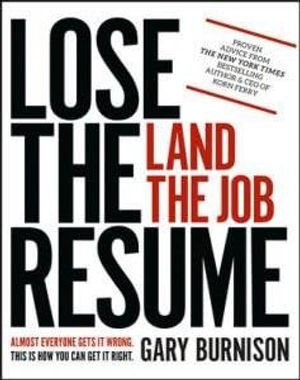Why This Expert Tells Job Hunters: You're Doing It Wrong
Be a detective, notes the 'Lose the Resume, Land the Job' author
Gary Burnison is the CEO of Korn Ferry, the world’s largest executive recruiting firm, which claims to place one professional in a job every three minutes. So Burnison knows a thing or two about the process of a job search. He just wrote a book distilling his best advice for job hunters — bluntly. In Lose the Resumé, Land the Job, Burnison says you're doing it all wrong.

The resumé, he maintains, is the least important part. Yet it’s the part job hunters agonize over and assume is why they either don’t get hired or do get hired but wind up in jobs they hate.
At 57, Burnison is especially attuned to the challenges that job hunters in their 50s and 60s face. He emphatically believes you can get hired at that age. “At Korn Ferry, we have employees in their late 70s and early 80s. We don’t have a formal retirement policy or an age limit. I’m dead set against that,” he told me.

Here’s the advice Burnison shared with me for job hunters over 50:
Next Avenue: You write that finding a job has never been harder. Why?
Gary Burnison: The competition is global. I remember as a kid, you picked up the help wanted ads in the paper and that’s how you got a job. Today, the ad is global. Theoretically, 7 billion people will see that help-wanted ad.
Also, a lot of jobs are now virtual. You don’t have to be in a particular geographic area to do them.
When it comes to job hunting, you say almost everyone gets it wrong. Why is that?
They do more research buying a washing machine than figuring out where they want to look. They don’t take any control of their destiny. I’m shocked by it.
What kind of research should they be doing?
They focus on the money and the title and the bling, which is important. But they ignore: Who am I going to be working for? What will it be like? What will I learn? Will I grow? Does this job make me excited? They fail to consider the soft things that are the arbitrators of your performance.
How can you know these things in advance of taking a job?
Do the whole three degrees of separation: do you know someone — or someone who knows someone — there who can give you a read into the culture of the organization? In the interview process, you can pick up on some things: how are they dressed, what’s their track record on people being promoted? You’ve got to be a detective.
You say people are hired for what they know but fired for who they are, so job hunters need to make sure they fit the company culture. How do you do that?
It’s the little things. Figure out the dress attire as you talk to people through social media and LinkedIn. Find out: What’s the culture there like at 7 a.m. and at 7 p.m.? Do families get together? You’ve got to ask questions.
Are sites like Glassdoor and Vault useful to get this kind of information?
No. Take them with a grain of salt. Anyone can post comments there.
Do you think job hunters in their 50s and 60s have an advantage or a disadvantage in their ability to do this kind of research?

People in that demo have what is very hard to replicate: judgment. So the idea of culture, fit and understanding who you’re going to be working for accrues; the older you are, the better able you are to make judgments.
Why do you say ‘lose the resume’ to land a job?
Most people think the resumé is 80 percent or 90 percent of getting a job. It’s not. It’s only 10 percent. What happens is people spend so much time trying to come up with the right Roman font and action verbs for things they probably never did in the first place that they forget the forest for the trees.
I often hear people looking for jobs say they’ve sent out dozens or hundreds of resumés and didn’t hear back. What’s going on there?
It’s a joke. You might just as well go to 7-Eleven and buy a lottery ticket. Your chances are just about the same. I’m mortified by people who think that’s the answer. I receive thousands of resumés and I haven’t opened one of them.
What do job hunters in their 50s and 60s do wrong and what should they be doing instead?
Because of the experience they’ve gained in numerous settings — family, life and jobs — they have a pretty good sense of what makes them happy. I know what makes me happy. So, OK, you need to ask yourself: What kind of companies and people would give me that purpose and where could I add something they don’t have?
Target where you want to work. Think about: ‘What are my strengths and my blind spots?’ Then say to yourself: ‘What industry sectors do I like and what have I done in the past that’s adjacent to them?’ Then ask: 'What are the companies in those sectors or where are the cities to do this?'
Then, do research through LinkedIn and Google to find out who is at them and start networking. Find out whether they have a job opening and get introduced by another human who can validate you.
I do want to ask you a few questions about resumés. You have a few ‘lose the resumé’ rules. One is: Don’t ask anyone who loves you to critique your resumé. Why not?
Because you want a fresh perspective. They are way too close and emotionally attached. You want to get an unbiased view.
Another of your rules: Never describe yourself on your resumé as energetic, innovative, a team player, a self-starter or a good communicator. Why not?
If I had a dollar for every time I saw those words... They’re not real. They’re not authentic. Clichés are terrible.
You don’t think people should put their job objective on their resumé. Why not?
The chances of you being on the mark are one in a hundred. Your objective will either be too low or too high. I don’t care what your objective is; I care what you’re going to do for me.
You say people should list on their resumé every job they had in reverse chronological order. But people in their 50s and 60s are often told to lop off jobs from the beginning of their career or take some off just to keep them from looking old due to a long career. Why shouldn’t they?
Listing every job shows the totality of your experience. It’s ridiculous to think the employer won’t figure out how old you are. Don’t kid yourself. But for jobs you had farther back, I would just put the company, title and year.
You say your current job should take up 75 percent of the detail of your professional experience. Why?
Because that’s going to be most relevant.
You also recommend job hunters think about three stories they will want to tell their job interviewer. What kind of stories?
Pretend you’re going on TV. Think about your biggest accomplishments and then come up with three bullet points about them. Tell me your three biggest accomplishments and try to make them into stories.
You’re the CEO of the world’s largest executive recruiter firm. But you say you shouldn’t work with a recruiter to get hired for a job. Why not?
Recruiters represent companies, so they have specific needs and moments in time. The chances of when you need help at that exact time is a little like ships passing in the night. Work with them, but over a long haul.
What do you think about the advice some career coaches give job applicants to ‘develop your personal brand?’
I’m not as concerned about somebody’s personal brand as are they going to help me grow the company and fit the culture we’re building.
Do you think there’s more age discrimination by employers these days or less than in the past for job hunters?
I don’t believe it’s the case like it was. And there are 75 million boomers, but the millennial generation is smaller. So at some point, there’s going to be a labor shortage and companies are going to have to, out of necessity, have people with a wider spectrum of demographics. Maybe not today, but the numbers are the numbers.
What’s the biggest mistake you’ve made looking for a job?
I haven’t networked like I should have. When I look back on my 30 years in business, that’s one of my personal regrets.


